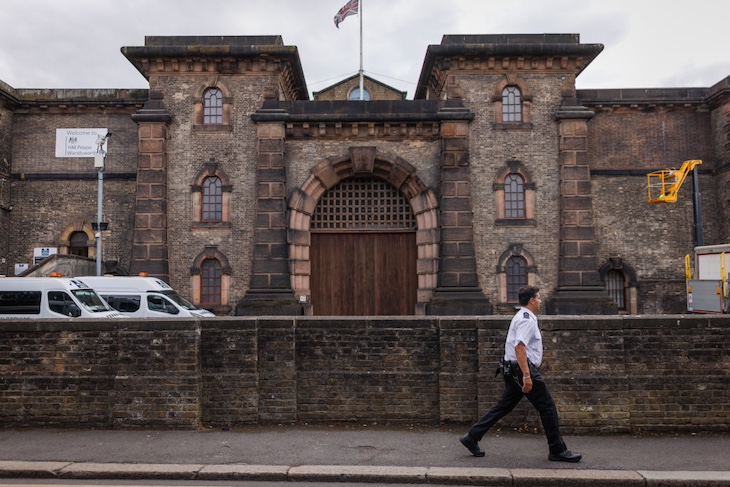I met Daniel in a high-security prison, where I worked as a prison officer. He was just 21. We’d talked about him a lot before he arrived on the wing – we passed the security briefing on him back and forth, scrutinising his vacant mug shot and the endless red bullet points beneath it:
- Hostage Taker
- Staff Assaulter
- Bully
- Climber
Climber wouldn’t ordinarily be a problem, but in prison it is. Daniel had scaled fences, walls and roofs in previous prisons. He’d staged one-man demonstrations in the scalding sun, shouting abuse to the news crews that congregated outside the jail, his pale white skin reddening as the hours wore on. And now he was here. His initial offence didn’t warrant placement in a high-security prison, but his behaviour inside did.
He was fine for a while. He did as he was asked, followed the rules, didn’t fight. But he couldn’t control his temper. The tiniest thing set him off. Soon I was no longer watching him on the wing, but escorting him to the Segregation Unit for a meeting with the prison Governor. It was a bitterly cold day in January 2013. The corridors shone with moisture from the cold. There were signs taped to the bricks telling officers to be careful when running, the floor is wet.
I’d read Daniel’s file. He was different to the other men here. He wasn’t serving life for murder, for one. And despite having only 18 months left to serve, he was angrier than them. He wore it on his face, and in his mannerisms, and the way he carried himself. Clenched fists and a permanent snarl. But he had it better than anyone else did. His current sentence was the latest in a long line of being locked up for short periods of time. A couple of months here, a year or two there. The man in the cell next door to him was there for life.
‘Don’t you get tired of this?’ I asked. ‘The seg?’ he asked.
‘All of it,’ I say. ‘Prison.’
He shrugs. ‘It’s just part of it. It’s an occupational hazard.’
And he was right. I left that prison two years later, but I saw Daniel many more times. I escorted him to different Segregation Units in different prisons. I watched as teams of staff in balaclavas and boiler suits with riot shields arranged themselves outside his latest cell door. I wished him well the day before his release, then read about him in the paper a few weeks later.
Almost nine years after we first met, I sat on a table beside him inside yet another high security prison. This time his face was older, his forehead more lined and hair a little lighter, but he had the same expression.
‘Do you ever get tired of this?’ he asked.
We watched as a group of young offenders played pool on the landing beneath us. A man in a wheelchair joined the queue for the phone. A boy who barely spoke English wandered around aimlessly, repeating ‘coffee please?’ to anyone who would listen.
‘Yes,’ I said. It’s hard to say exactly what I was tired of. Not the people or even the bureaucracy. Maybe just the pointlessness of it all.
‘What do your parents think of you always being in prison?’ I asked. I know nothing about his family, except they never come to visit. Not that he seemed to care.
‘Nothing probably,’ he laughed. ‘They’ll be busy getting high somewhere.’
Given the amount of prisoners on the wing with glazed eyes and slurred speech, they might as well be getting high here, I thought to myself. But I didn’t say it.
Daniel was unusual when I first met him – the only 21-year-old in an adult prison. The only one serving a short sentence in a prison full of lifers. But things have changed. Young offenders are now housed with adults. The youth offending institutions are too overcrowded. And this prison is full of short termers. Many of them I have met before, too many times before.
Warren, who comes in every few months, poor and dirty and skinny. Or Julian, who gripped my hand in a west London hospital as the doctor stitched his cheek back to his face after a particularly gruesome assault on the wing. He was only serving a couple of years then, but now he circles the yard outside, remanded for murder. The Stevens brothers, all three of them, happy to be serving their latest sentence together but hoping their dad might be transferred here soon as well. He’s in a different prison up north now. Their mum too, in fact. The family business. An occupational hazard.
Dan leaves that jail less than a year later. I do too, as it happens. It turns out I was more than tired of it. I resign.
I never escort Dan to the segregation unit again, or lock his cell door behind him, or sneak him an extra pack of crisps. But I see his face one more time, in the local paper again.
Man, 33, shot and killed outside pub. Police appeal for information.
An occupational hazard. The pointlessness of it all.







Comments